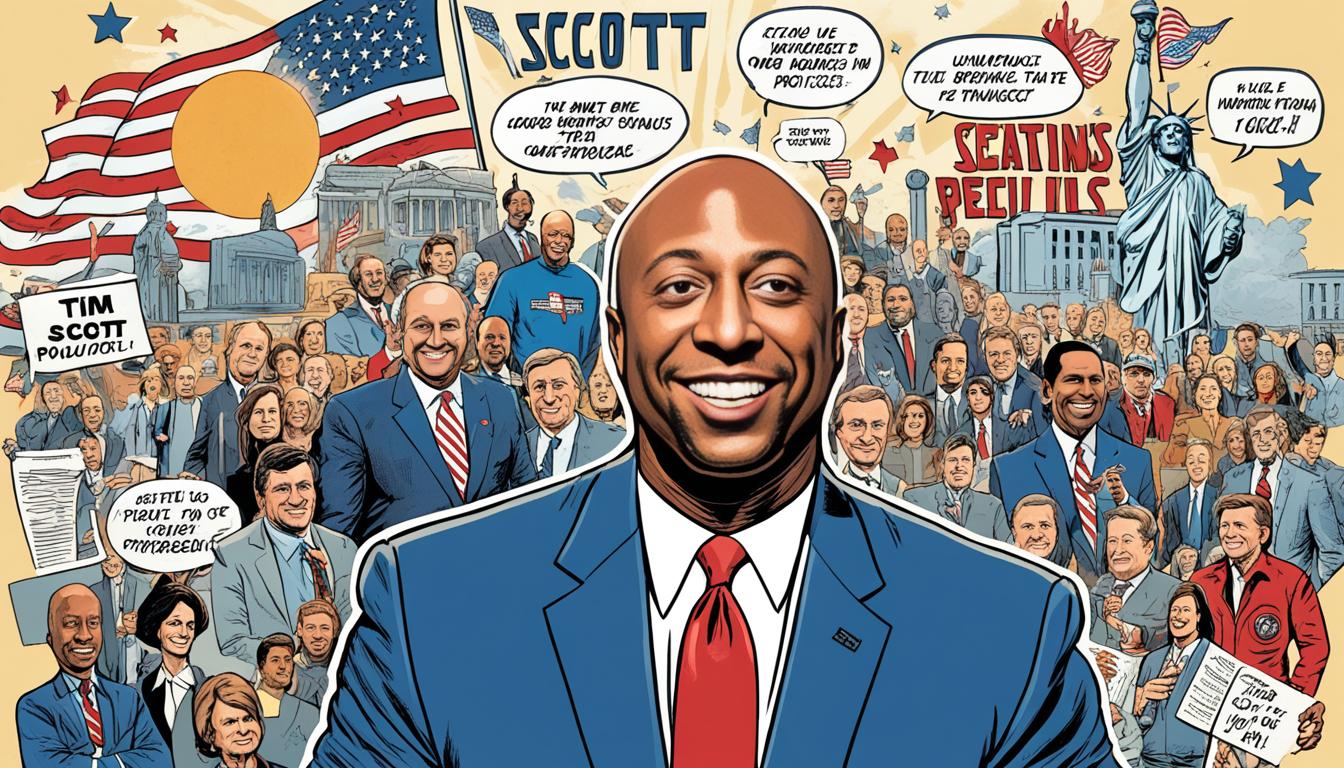Tim Scott grew up in North Charleston, South Carolina. He lived in a modest house with his mother. They faced many challenges, but Scott’s hard work and will to succeed shaped his future in politics.
Scott was raised by a single mother. The world seemed tough. But his mother’s endless support and a mentor’s advice showed him the value of learning. Education helped him to reach his dreams and break free from his struggles.
Scott finished his degree at Charleston Southern University. Then, he started his own small business. This venture sparked his love for entrepreneurship and helped him connect with people.
Tim Scott decided to serve the public with a clear goal. He wanted to touch the lives of a billion people. His commitment led him to roles in local and state government, and then to the U.S. Senate.
Tim Scott’s story is powerful. It shows how determination and hard work can change your life. He inspires many, proving you can achieve great things no matter where you come from.
Key Takeaways:
- Tim Scott began his journey in a poor, single-parent household, but his determination propelled him towards success in American politics.
- With the support of his mother and a dedicated mentor, Scott excelled academically and established a successful small business.
- Driven by his mission statement, Scott embarked on a career in public service, serving in various elected positions.
- Scott’s story is a testament to the transformative power of perseverance and the ability to overcome adversity.
- His journey inspires individuals and highlights the potential for positive change in American politics.
Tim Scott’s Rebranding of Conservatism
Tim Scott, the first African-American senator from the South since Reconstruction in 20131, stands out in American politics today. He brings a fresh view, focusing on unity, opportunity, and progress. He wants to update conservative ideas for our time.
In 2014, Scott won a special election and took over Jim DeMint’s term. By 20161, he won a full term. His wins made him a key voice for Americans of all backgrounds.
Scott works closely with Congressman Trey Gowdy. They wrote “Unified: How Our Unlikely Friendship Gives Us Hope for a Divided Country”1 together. Their book talks about finding common ground over political divides.
Scott pushed for opportunity-zone legislation. It encourages investment in needy areas. President Trump supported it, and it became law with the tax reform at the end of last year1. Scott aims to boost entrepreneurship and help areas in need.
Scott’s approach has attracted many, even those tired of current politics. He moves past identity politics, focusing on values and principles. His unique take on conservatism brings a new, inclusive future vision.
| Tim Scott’s Impact on Rebranding Conservatism | |
|---|---|
| Favorability Ratings | South Carolina: 52% overall, 76% among Republicans2 |
| Support in Iowa | 7% among likely Republican caucus-goers2 |
| Second Choice of Scott’s Supporters in Iowa | 28% Trump, 25% Haley, 23% DeSantis2 |
| Potential Impact of Felony Counts against Trump | 67% of likely South Carolina Republican primary voters state that it would not affect his fitness for the presidency if found guilty2 |
| Campaign Efforts | Americans for Prosperity in South Carolina made more than 1.1 million phone calls and knocked on over 300,000 doors2 |
| Current Standing in Presidential Race | Polling suggests Trump holds a massive double-digit lead, with other candidates struggling to break 25%2 |
| Emerging Alternatives to Trump | DeSantis and Haley are battling it out to emerge as the clear alternative2 |
| Timing | Time is running out for candidates to make their case against Trump as the holiday season approaches2 |
Tim Scott’s Balancing Act in the GOP
Tim Scott is a key figure in the Republican Party. He’s working hard to balance different views within his party and the larger political scene3. He hasn’t openly criticized President Donald Trump like Jeff Flake and John McCain. But, Scott is being careful to keep peace in the GOP3.
Scott picks his battles wisely and strives to balance criticism and support for the party’s goals. This strategy helps him stay influential in the party. It also lets him push for changes he believes in3.
As South Carolina’s first Black U.S. senator3, Scott offers a unique view. He’s known for bridging divides and collaborating with others3. Scott focuses on finding common ground and has worked on efforts like the bipartisan policing reform after George Floyd’s death3.
By supporting Donald Trump over Nikki Haley, Scott showed his dedication to the GOP3. This move proved his loyalty and reinforced his role as a uniting presence in the party3.
Scott’s possible run for president looks promising, thanks to his $22 million from his 2022 Senate campaign4. This financial backing shows donor confidence and makes him a strong candidate4. Plus, some in the GOP want a new direction in 2025, different from Trump’s style. Scott’s conservative record could attract these voters, boosting his chances4.
Tim Scott is skillfully navigating the GOP’s complexities. With smart choices and teamwork, he’s gaining respect. Scott’s support for the party’s goals has marked him as a potential future leader3.
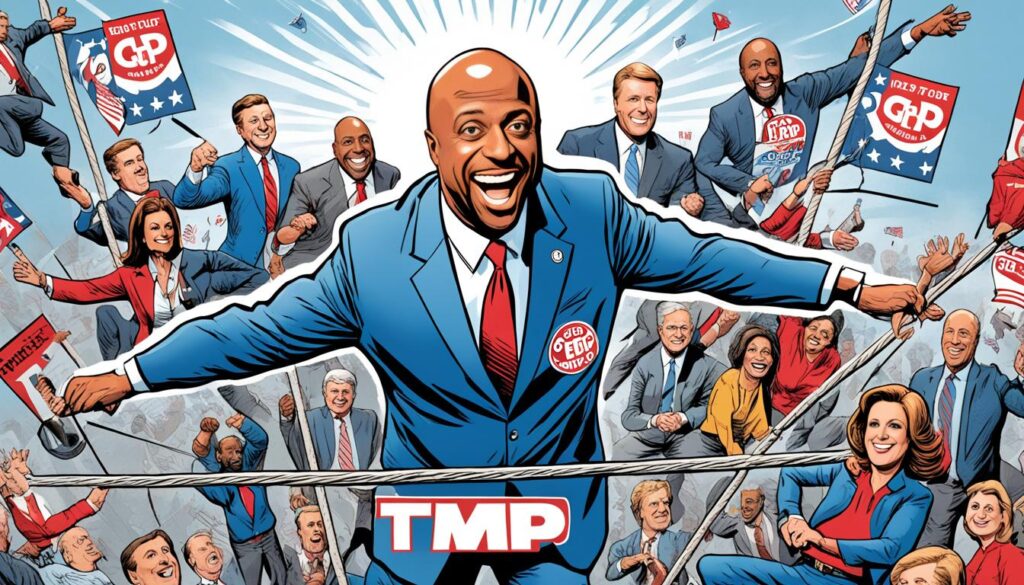
Tim Scott’s Key Votes in the 117th Congress
During the 117th Congress, Tim Scott was actively involved in key legislative actions. He showed his dedication to the people of America. Here are some of the important votes he made.
American Rescue Plan Act of 2021
The American Rescue Plan Act of 2021 was voted on March 11, 2021. Tim Scott voted no. He was worried about how it would impact government spending5.
Infrastructure Investment and Jobs Act
On November 15, 2021, the Infrastructure Investment and Jobs Act was voted on. It aimed to better our nation’s infrastructure. Tim Scott voted yes, seeing the need for investment in our critical infrastructure needs5.
Inflation Reduction Act of 2022
The Inflation Reduction Act of 2022 was up for a vote on August 16, 2022. This act focused on climate change, healthcare costs, and tax rules. Tim Scott voted for it, showing his dedication to solving big issues for Americans5.
National Defense Authorization Act for Fiscal Year 2022
The Senate passed the National Defense Authorization Act for Fiscal Year 2022 on December 27, 2021. The vote was 88-11. Tim Scott supported this bill, highlighting his strong stance on national defense5.
James M. Inhofe National Defense Authorization Act for Fiscal Year 2023
On December 23, 2022, the James M. Inhofe National Defense Authorization Act for Fiscal Year 2023 passed. It had an 83-11 vote. Tim Scott’s yes vote shows his continuous support for national security and military families5.
Sergeant First Class Heath Robinson Honoring our Promise to Address Comprehensive Toxics Act of 2022
The Senate voted on the Sergeant First Class Heath Robinson Act on August 10, 2022. It passed with an 86-11 vote. Tim Scott’s support symbolizes his dedication to battling comprehensive toxics and protecting people and communities5.
Chips and Science Act
The Chips and Science Act passed in the Senate on August 9, 2022, with a 64-33 vote. Tim Scott voted for it. His vote reflects the importance of pushing forward technology and scientific research5.
Women’s Health Protection Act of 2021
The Women’s Health Protection Act of 2021 did not pass, scoring a 46-48 vote. Tim Scott voted against it. This decision mirrors his views on the matter5.
Consolidated Appropriations Act, 2022
On March 15, 2022, the Senate passed the Consolidated Appropriations Act, 2022. The vote was 68-31. Tim Scott supported this act, showing his commitment to fiscal responsibility and proper funding allocation5.
Respect for Marriage Act
December 13, 2022, saw the Respect for Marriage Act pass in the Senate. The vote count was 61-36. Tim Scott’s approval of this act stresses his commitment to equality and protecting everyone’s rights5.
Continuing Appropriations and Ukraine Supplemental Appropriations Act, 2023
The Senate passed the Continuing Appropriations and Ukraine Act on September 30, 2022. With a 72-25 vote, Tim Scott supported this act. It shows his commitment to providing essential funding and support5.
COVID-19 Hate Crimes Act
The COVID-19 Hate Crimes Act was passed with a 94-1 vote on May 20, 2021. Tim Scott voting yes underlines his dedication to fighting hate crimes5.
Postal Service Reform Act of 2022
On April 6, 2022, the Senate voted on the Postal Service Reform Act of 2022. It passed with a 79-19 vote. Tim Scott’s support signifies his commitment to improving our society’s essential institutions5.
Bipartisan Safer Communities Act
The Bipartisan Safer Communities Act passed on June 25, 2022, with a 65-33 vote. Tim Scott’s support for it shows his dedication to safer communities and public safety5.
Extending Government Funding and Delivering Emergency Assistance Act
The Senate passed the Extending Government Funding and Assistance Act on September 30, 2021. It was a 65-35 vote. Tim Scott’s favor shows his commitment to providing help during emergencies5.
Tim Scott’s roles in various Senate committees show his wide range of interests. From banking to foreign relations and small business, he’s dedicated to many issues6. He has led 14 bills to become law, like the sanctions on fentanyl trafficking and the FASTER Act of 20216.
While Tim Scott has shown deep commitment, he missed 4.9% of votes since January 2013. That’s 194 out of 3,980 votes. This rate is above the median for current senators. Yet, the 14.9% missed votes in early 2024 suggest variability6.
| Legislation | Vote Result | Date |
|---|---|---|
| American Rescue Plan Act of 2021 | 50-49 | March 11, 2021 |
| Inflation Reduction Act of 2022 | 51-50 | August 16, 2022 |
| National Defense Authorization Act for Fiscal Year 2022 | 88-11 | December 27, 2021 |
| COVID-19 Hate Crimes Act | 94-1 | May 20, 2021 |
| Postal Service Reform Act of 2022 | 79-19 | April 6, 2022 |
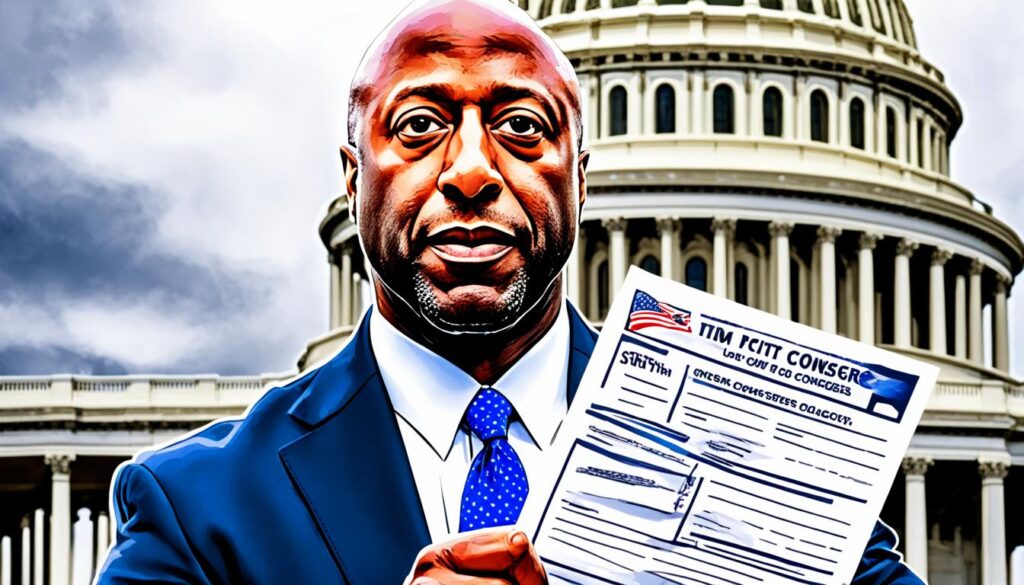
Tim Scott’s Impact on Conservative Values
Tim Scott is the only Black Republican senator right now. He impacts conservative values by speaking in ways many Americans connect with. His own life and his insights into disadvantaged communities shape his policies on opportunity, business, and financial empowerment. His dedication shines in the Investing in Opportunity Act. This act boosts investments in neighborhoods needing help7.
Recent polls show Scott has 1% support among Republican primary voters nationwide7. But in South Carolina, his home, 7% of Republicans back him. This puts him in fourth place behind big names like Nikki Haley, Donald Trump, and Ron DeSantis7. These numbers mean Scott has found a special group of Republican supporters, despite not being well-known everywhere7.
It’s interesting to look at candidate favorability. Almost half of the Republicans don’t want Trump to run again, yet 68% still like him7. Scott’s fundraising is impressive, with nearly $22 million ready for his campaign7. Tech giant Larry Ellison even gave $15 million to a Super PAC supporting Scott. This shows notable financial backing7.
Still, Scott’s campaign needs to stand out among other Republicans. His policies often match Trump’s7. With Trump still popular in the party, this is a tough fight. But Scott’s positive American future vision and his call for “new leadership” might win over some Republicans looking for change7.
About half of U.S. adults see religion as key in choosing a president8. Scott’s traditional values and support for the Ten Commandments connect with these voters8. A Florida real estate agent, 51, considers Scott a breath of fresh air for conservatives8.
But not everyone agrees on Scott’s religious stance. The South Carolina ACLU has battled to remove the Ten Commandments from public places, challenging Scott’s religious freedom focus8. Democrats want to tie Scott with Trump’s policies, especially his stands on abortion and certain birth control methods8.
In the end, Tim Scott’s conservative impact is complex. While gaining broader support and his distinctiveness from other Republicans is hard, his efforts in economic empowerment and commitment to values win some support. His stand on traditional and religious values attracts voters prioritizing faith. As Scott maneuvers through politics, his influence on conservative values and the Republican future will develop78.
| Statistical Data Reference | Source |
|---|---|
| 7 | Various statistical data from political polls, including Morning Consult, Winthrop University, and AP/NORC |
| 8 | Statistical data on religious beliefs and practices from various sources |
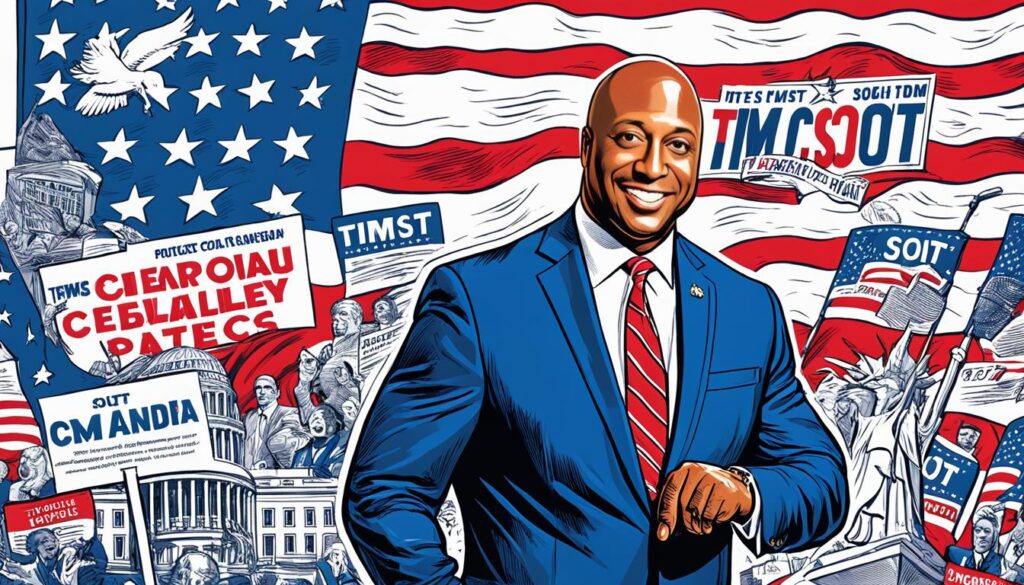
Tim Scott’s Growing Influence
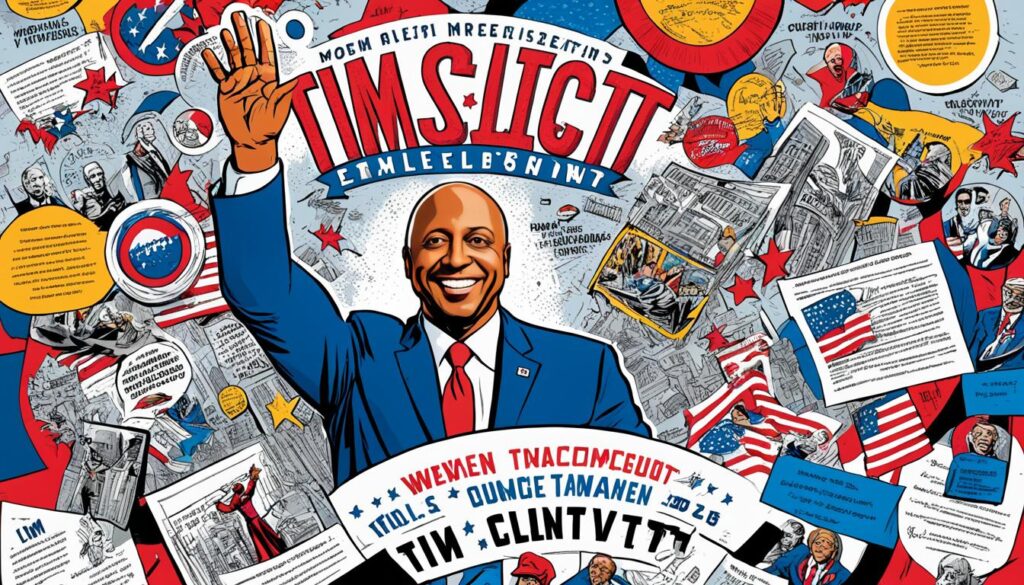
Tim Scott’s role in the Republican Party is growing. He’s known for working with both parties. This has made him a key figure in Congress9. He’s known for tackling tough issues and getting things done. His work has gained him respect from many colleagues.
He’s seen as someone who can lead and shape America’s future. His bipartisan efforts set him apart. Scott is a powerful legislator and helps bridge divides.
As the only Black Republican in the Senate, Tim Scott is unique9. He brings important views on race to his party10. His insights help the Republican Party become more inclusive10.
Scott worked with Sen. Cory Booker on important hate crime legislation910. Their law now recognizes lynching as a federal hate crime. This law, signed by President Biden, shows Scott’s significant impact9.
Scott has also focused on economic and criminal justice reform. He contributed to the First Step Act9. This law aims to improve the federal prison system and lower repeat offenses. His involvement in creating “opportunity zones” in 2017 also highlights his dedication to economic growth910.
Tim Scott’s voting record shows his influence9. He supported President Trump’s views 96.7% of the time. Under President Biden, he has supported the President’s stance 14.7% of the time9. Scott values working together and making decisions for the good of his constituents9.
Tim Scott’s Growing Influence at a Glance
| Statistic | Impact |
|---|---|
| Senate’s only Black Republican9 | Bringing diversity and inclusivity to the Republican Party10 |
| Championing legislation on racial equality and justice910 | Addressing historical injustices and promoting equality9 |
| Playing a significant role in bipartisan achievements9 | Promoting economic development and criminal’s justice reform9 |
| Consistently working across party lines9 | Making independent decisions based on convictions and constituents’ best interests9 |
Conclusion
Tim Scott’s journey from tough beginnings to becoming the first Black senator in the South since Reconstruction11 is a story of resilience and determination. Elected in a special election in 2014, he quickly became a key figure in politics. He pushes for conservative values and aims for a more inclusive nation. Despite facing racism and stereotypes11, he’s committed to challenging a liberal agenda. He aims to be more than just a symbol11.
At a campaign event, Scott talked about racism in America but argued our systems aren’t racist11. He points out progress made since the days of slavery and the civil rights era. Scott insists racism shouldn’t define us or shape our future11.
The US is dealing with economic issues like rising inflation and bigger federal debt12. Families are spending an extra $8,508 for the same goods as before Biden’s presidency12. Prices of basics like butter, chicken, and bread have jumped12. Fuel and energy costs are at record highs, squeezing budgets12. Some blame corporations for inflation. But, The Federal Reserve says government actions and policies are big factors12.
Tim Scott’s political rise and commitment to conservative ideals have made him a key figure in the Republican Party. He’s a beacon of reason and resilience, aiming to better America for everyone. His effort to impact a billion lives shows his ambition11. His insights into economic struggles and inflation showcase his role as an advocate for change12.

